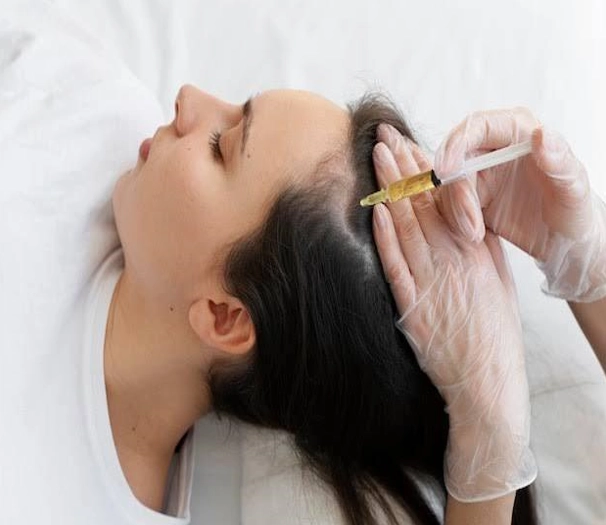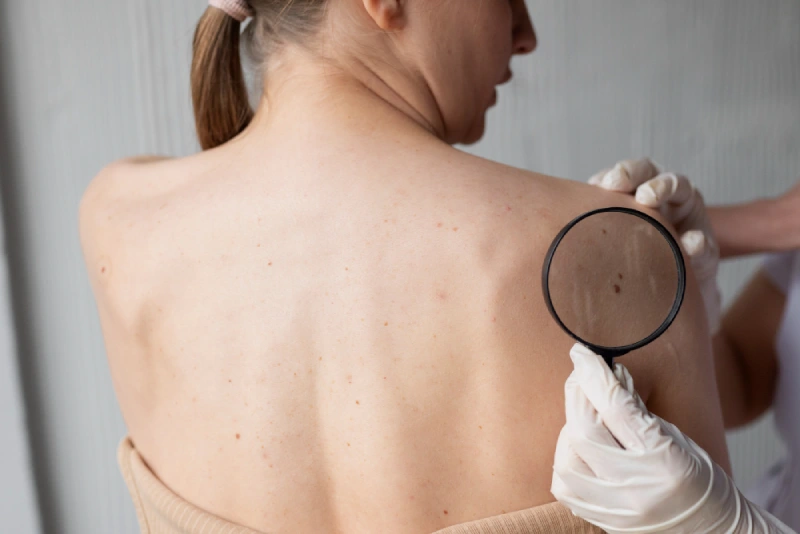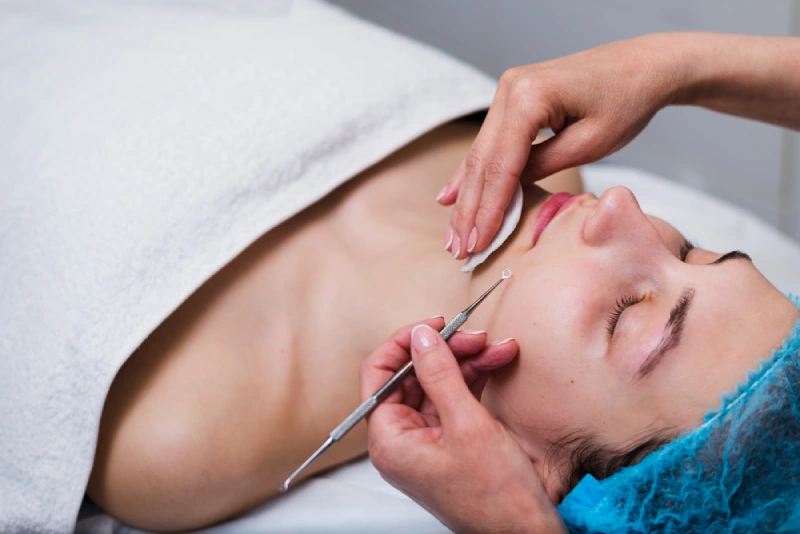Everything You Should Know About Acne Scarring and Treatment

In continuation of this month’s topic on acne and acne scarring, we’re diving into treatments for both. Get ready to take notes!
Acne treatments
It is essential to tackle any active acne before treating scarring since new breakouts can create even more scars. Treatments for acne can include:
- Home remedies such as Witch Hazel or tea tree oil
- Over-the-counter treatments
- Prescription medications such as antibiotics and hormone-reducing treatments
- Laser treatments
- Skin surgeries
- Chemical peels
Here are some tips and tricks to try if you’re experiencing a flare or worsening acne:
- Try a retinol or retinoid cream
- Benzoyl peroxide wash or cream can help
- Reduce sugars, carbs, junk food, fast food, whey, or milk in your diet
- Eat mostly green leafy veggies, fruit, lean meat and fish
- Reduce stress by meditating daily and/or working out regularly
If the above do not work or your acne is leaving scars, it’s time to see your board-certified dermatologist as soon as possible as early treatment can prevent permanent scars.
On occasion, teenagers use harsh facial or body scrubs, alcohol-based astringents and tanning to try to clear acne. In reality, all of these can worsen the situation. Research has also shown treating your acne can help reduce depression and anxiety while boosting self-esteem.
About acne scars
Acne scarring is just as common as acne. An acne scar is created when the skin becomes inflamed, acne is left untreated, or pimples are picked at or manipulated. Pimples that are squeezed, popped or picked become further inflamed which increases the likelihood of an acne scar forming. Further, there is a genetic link to acne scarring. Patients whose parents or other family members have a history of severe acne or acne scars can have a higher risk of developing acne scarring themselves.
There are two types of acne scars: Depressed (or “atrophic”) and raised (or “hypertrophic”). When the skin tries to heal from acne on the face or body, it creates collagen to try to repair the wounds acne leaves behind. Your skin can produce too little or too much collagen, causing either depressed or raised scars, respectively. Acne scars can be avoided by seeing a dermatologist early when your acne first appears, before inflamed acne, cysts or nodules form permanent scars.
Acne scar treatments
Scar treatments include retinoid creams, chemical peels, microneedling, laser treatments and even filler injections. These treatments can improve the appearance of scars, dark spots and uneven skin textures caused by acne on the face or any other part of the body.
In skin of color, acne can cause post-inflammatory hyperpigmentation, or darkening of the skin, due to inflammation. These dark spots can vary in color from red to light or dark brown. If a person has more melanin, or color, in their skin, these lesions can appear very dark or even black. These discolorations and marks can be disfiguring and last months or years if left untreated. UV light exposure that occurs when you are exposed to the sun or a tanning booth can make these dark spots even worse. For this reason, it is important to use sunscreen daily to prevent dark marks and spots from getting even darker.
Dr. Obayan can diagnose the specific type of acne you have and work with you to create a plan to help treat your acne scars and resolve any active acne. Hello, beautiful skin!
What is Holistic Dermatology?
Holistic dermatology relies on using all-natural products and remedies to treat skin conditions. Using natural dermatology to treat the underlying causes of an individual’s skin problem using the least invasive means first.
What Causes Your Skin to Break Out?
Although everyone has different underlying causes for skin issues these are some common things that can cause anyone’s skin to break out. Acne affects up to 80% of people sometime during their lives. So, it’s important to know what might be causing the breakouts so you can preemptively treat the root causes instead of focusing only on the symptoms.

Clogged Pores
The simplest cause of most breakouts are clogged pores for an assortment of reasons. Acne of all stages, white heads, black heads and pimples are all caused when your hair follicles become clogged with excess oil and dead skin cells. Often time in addition to regular daily activities, excess sweating, make-up use or a build-up of other products can affect negatively affect your pores.
Chronic Stress
One of the biggest factors when it comes to breakouts is hormonal changes. Hormones fluctuate for many different reasons and stress is one of them that affects both genders. Emotional stress hasn’t been proven to trigger brand new cases of acne, but it can prolong or worsen existing breakouts.
Inflammatory Reactions
Contrary to popular belief cutting out greasy foods alone has very little effect on acne. However, many studies have found links between worsened acne symptoms and dairy products, sugar, and carbohydrate-rich foods. It’s important to note that people’s bodies respond differently to all types of dietary restrictions, so it may not be a quick fix.
Tips and Tricks for Effective Holistic Dermatology
While many people are stuck at home unable to visit the dermatologist, the following suggestions are some holistic acne treatment tips that can be used at home.
Simple Stress Relievers
When cooped up at home, or under pressure from outside sources it’s important to take time for yourself and acknowledge the connection between a person’s mental health and their physical well-being. Practicing deep breathing or yoga, reducing your caffeine intake, exercising, lighting incense or candles and listening to music are all simple ways to reduce some stress that can have a positive effect on your skin.
Keep Clean
It may be common sense that you should establish a routine even when at home, but it can easy to forget. Avoiding touching your face is not only a good suggestion to avoid getting sick and spreading germs but it also keeps extra dirt and bacteria from transferring from your fingertips to your pores. While it is important to remove excess oil, buildup, and sweat washing your face too frequently or with harsh chemicals and exfoliants can have adverse effects as well. Use warm, water and a mild cleanser, do not scrub, rinse with cool water, pat dry with a clean towel and follow up with a moisturizer of your choice.
Switch Up Your Diet
While you may not have a severe allergy to certain foods or food groups if you are noticing worsening skin issues such as dryness, discoloration, itchiness and increased breakouts it’s worth it to examine your diet. Keep a food journal to help you keep track or try your own version of an elimination diet if you already suspect certain types of foods may be causing a break out. In general, decreasing your intake of processed food and sugar is a great first step. Increasing cruciferous vegetables such as broccoli, cauliflower, and brussels sprouts will help detoxify your system and fresh berries can help reduce inflammation.
Use Natural Products
There are some natural products that you may already have at home that can be used to relieve some symptoms. Dry bouts of inflammation like psoriasis or eczema can be soothed with ginger root, spirulina, and turmeric which are all-natural anti-inflammatory immune boosters. Oily skin and acne breakouts can be reduced with witch hazel and tea tree oil. Both of these can be used as a holistic treatment for acne because they address bacterial build up and help keep your skin clean and dry. Bakuchiol, a new and exciting holistic treatment has been shown to act like a natural retinoid, with less irritation. It can reduce acne and inflammation and prevent wrinkles.
Power Up with Probiotics & Supplements
Keeping your skin healthy from home can be as simple as boosting up your internal nutrients. A lot of nutrients come from our diet, however, sometimes supplements can help fill the gaps. Studies have linked increased intake of probiotics, omega-3’s, vitamin B, vitamin D, and zinc to benefiting people with acne. If you are unable to get these supplements, work on incorporating a nutrient-dense diet, make an effort to eat and drink things with higher levels of these key nutrients.
Consult with a holistic dermatologist online!
While non-emergency in-person appointments have been put on hold as a result of the COVID-19 pandemic, receiving a virtual consultation with a holistic skin care specialist to better understand your individual situation is highly recommended.
Get in Touch




